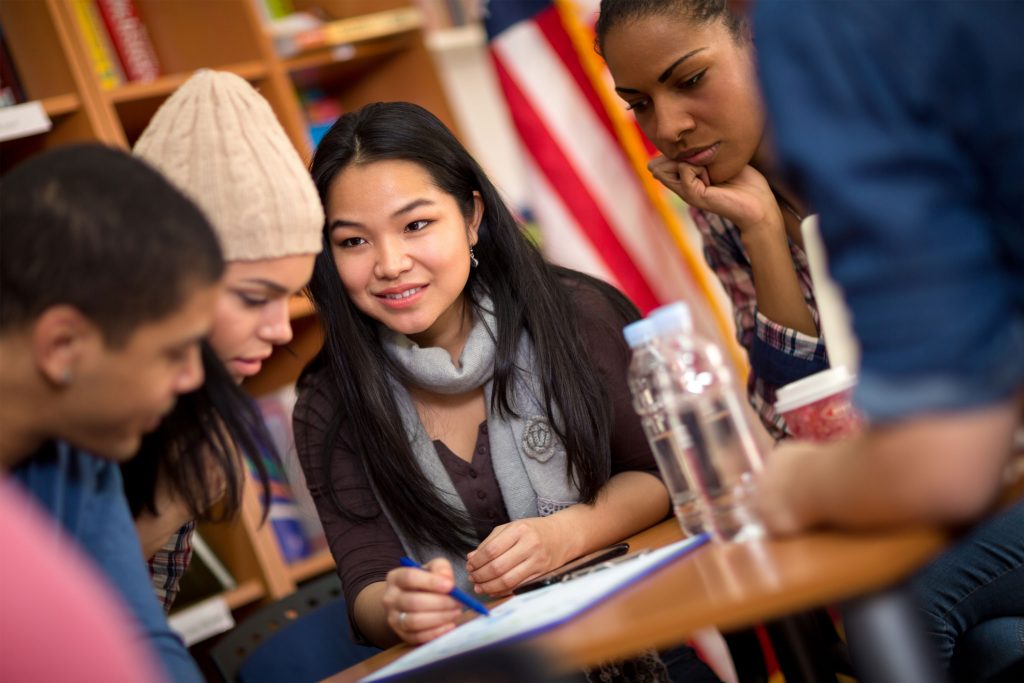Not enough credits … What should parents advise?
‘My daughter has not enough credits,’ my colleague Ineke sighed. ‘What should I advise her. She’s so disappointed.’ Yes, I can imagine that she is, and I can also imagine that, as a mother, you’re concerned about the credits. I’ll try to give you and your daughter some tips (in het Nederlands, Dutch version).

Not enough credits … What should parents advise?
What are credits?
Credits are a calculation unit. For every 28 hours of successful studying, you get 1 credit. If you followed a course in which you’ve worked for 280 hours, you may have had 80 hours of lectures and 200 hours of independent study. To see if you have studied well enough, you have to take an exam. If you pass the exam, you earn 10 credits. You also get a mark, just like at secondary school, but the focus is on the credits. In this example, the student has earned 10 credits. A full academic year consists of course material equal to 60 credits: 60 x 28 hours of work. A student can earn credits in various ways, including projects, excursions and a practical placement. (read about credits)
Completing your course of studies
If students are following a three-year bachelor’s programme, they must earn 3×60 credits. If students are following a four-year bachelor’s programme, then 4×60 credits. A two-year master’s programme is 2×60 credits. If a student fails to earn the required credits, he or she cannot graduate.
You don’t have to earn the required credits in the period officially allowed for the programme. You have to earn 3×60 credits for a three-year bachelor’s programme, but you can do this in four years.
The first year, binding study advice
The first year is an exception to the above. During this first year, students have to earn a minimum number of credits. This is called Binding Study Advice. Each programme can have its own Binding Study Advice. This is sometimes 36 credits, which is not very much. And sometimes students have to earn 55 or even all 60 credits, which means hard work. If a student has not enough credits for the Binding Study Advice, he or she must leave the programme. This is something to consider carefully when choosing your programme of study.
Not enough credits. Study skills?
Let’s go back to Ineke’s daughter.
First of all, almost everyone fails an exam. But fortunately, students can resit an exam. The examination regulations state how often you can resit an exam. But it’s important to discover why the student was unable to earn the credits.
I would advise Ineke’s daughter to think about what went wrong. Did she start studying early enough for this exam? Did she study effectively? Did she attend enough lectures? Did she ask enough questions? Did she work with others or speak with other students about the material? These are all related to study skills. Tip 1 for Ineke: Ask your daughter these questions.
Study advisor
Another question for Ineke:
Has your daughter already had contact with her study advisor or academic career counsellor? This person is comparable to the mentor at secondary school. He or she can offer help and advice for problems relating to the material of the courses being followed. Is your daughter in her first academic year? If so, her programme has been regulated in advance, and she has to earn these credits. But if she’s in another academic year, she can increasingly often choose her own subjects. The study advisor can help. Perhaps some subjects are more suited to her.
And what does the study advisor think about how your daughter studies? Is there room for improvement?
The academic career counsellor or study advisor tries to help students if their results are disappointing, but students themselves have to take the initiative. Unlike secondary school, students themselves must ask for help. Some institutions have a lot of ‘relief troops’, other schools do not.

Motivation
And then a rather personal question… Is your daughter truly motivated about this programme of studies? Motivation is the driving force behind studying successfully. Sometimes a programme turns out to be different from what you’d expected. When choosing a study, it’s very difficult to really get an idea of what a programme is actually like. Is your daughter in her first academic year? If so, that’s a difficult year. You have to follow the basic subjects and not the subjects that so appealed to you during the Orientation Days. That all comes later…
Wrong material? Wrong level?
Sometimes the subject matter of a programme of studies is not quite what you’d expected. Here again, the study advisor can help. Is there a similar programme that is more suitable? In the beginning, it’s easy to switch programmes, and you can even sometimes ‘take’ credits with you, even if you have not enough credits. Or maybe your daughter thinks her course material is very interesting, but she thinks that her lessons are too theoretical or too practical. You can follow almost every programme at the HBO or the university level. Which level is best for you? There are students who switch from HBO to university and vice versa.
Talk with senior students
Has your daughter already contacted senior students? They can be a big help to students. They can offer tips and tricks for the subjects that your daughter finds difficult. Or perhaps a senior student is willing to do some tutoring? And senior students can also describe what students can expect further in the programme. That could be just the motivational kick that your daughter needs…
Impediments?
Are there perhaps special impediments or handicaps? Then you should speak with the student dean. If your daughter is dyslectic, for example, special arrangements can be made for her. A lot of young people have special impediments or handicaps. Nothing to be ashamed of. But it’s important to ask for help. If you ask on time, the student dean can help you make arrangements. And can sometimes see to it that you can take longer to earn the required number of credits. But here again, you have to ask on time.
Tried everything? Not enough credits …
Your daughter has really tried everything, but the programme is the wrong one for her and she’s going to stop because she has not enough credits… Here too, it’s good for her to evaluate what went wrong. And the study advisor can be a good sounding board for this, as can you as a parent.
Give your daughter enough time to carefully consider a new programme of studies… if she in fact wants to start studying again. It’s better to take more time than to simply jump into another programme.
If you learn one thing from your first ‘wrong’ choice, it’s that nothing is lost. It’s worse if your daughter rashly makes another wrong choice. This damages her self-confidence and it also costs a lot of money. In that case, perhaps taking a year off isn’t such a bad idea. That gives her time to think about her choices and to talk a lot with you and with others.
Good luck, Ineke. And really,… although it can sometimes take a while… almost all young people manage in the end. And one more tip: your daughter is responsible for her own academic success. You can support her, of course, but she has to do it herself.

